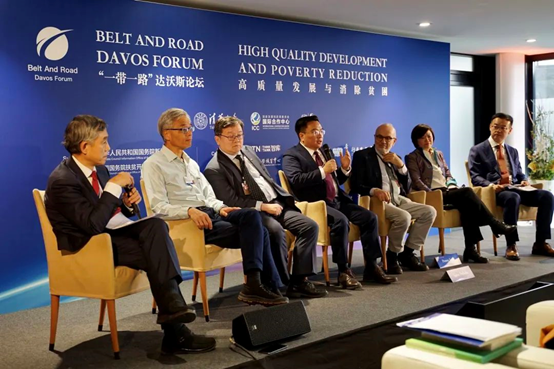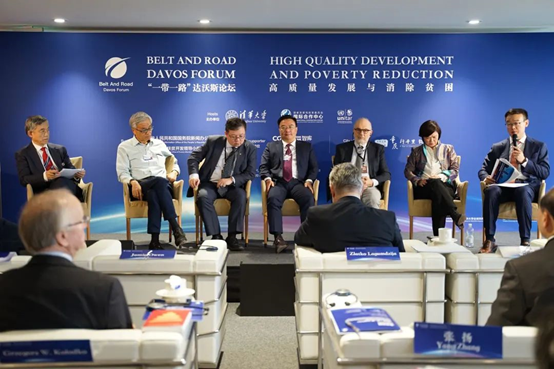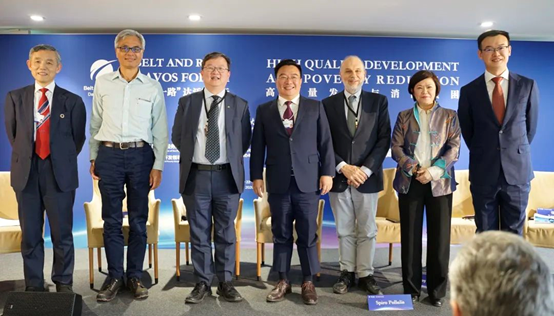On January 22, 2020, the fourth Belt and Road Davos Forum took place during the 2020 World Economic Forum (Jan 21-24). Initiated by Tsinghua University, the Forum was co-hosted by the International Cooperation Center of the National Development and Reform Commission (ICC-NDRC) and the United Nations Institute for Training and Research (UNITAR), and supported by the State Council Information Office and the State Council Leading Group Office of Poverty Alleviation and Development, with heads of governments, business leaders, experts and scholars from countries along the Belt and Road attended. Qiu Yong, President of Tsinghua University, delivered a speech at the Forum, and Vice President Yang Bin was also present.

The CISS hosted one of the three panels at the Forum, titled “Artificial Intelligence and Global Governance”. Chaired by Professor Xue Lan, Dean of the Schwarzman College, Tsinghua University and Director of China's New Generation AI Governance Expert Committee, the event focused on how to defuse the potential risks of AI through global governance. Six panelists from the United States, Britain, Singapore, Hong Kong (China) and Chinese Mainland were invited to discuss high-quality development and governance of AI from different perspectives.
Wei Shi, President of the Hong Kong University of Science and Technology, started from the situation in Hong Kong and noted that AI governance is a complex and serious issue. During the turmoil in Hong Kong in 2019, AI and data science played a negative role. Some people collected data to develop a mapping software to locate police in real time, resulting in the obstruction of law enforcement. In addition, Shyy believed data privacy and protection are of vital importance. For example, personal information on social media and the internet can be used without consent, which, however, has not drawn enough attention from most data companies. Therefore, AI governance requires both government regulation and enterprises’ responsibilities.
Guo Yike, Vice-President of Hong Kong Baptist University and Director of the Data Science Institute at Imperial College London, said that there are two urgent matters to be dealt with in terms of AI development. One is the capitalization of data. No AI product can be made without data. The other is ethics. Smart products’ behavior and social significance must be understood. He believed that AI development requires the building of block chains, which lays the foundation for a new and decentralized data economy. At the same time, the challenge for AI is not about how much the machine can do, but rather, whether the machine is doing the right thing. Developing accurate utility algorithms facilitates AI governance.
Zhou Bowen, President of JD Cloud & AI, believed that people worry about AI mainly due to its uncertainty, which can be addressed through three approaches. First, they should embrace new technologies with an open mind and realize that the development of AI is still in its initial stage; Second, their worries should be dispelled with positive responses and explanations so that they can believe technology and industrial development will eventually create jobs for the society; Third, the risks brought by the delay of rule-making should be defused with Agile Governance. At present, the international community has reached an initial consensus on Trustworthy AI, which can be the core development technology of this field.
Spiro N. Pollalis, Professor of Design, Technology and Management at Harvard University, believed that in spite of its great potential, AI is ultimately a tool for human beings. The risks of AI lie in its users and how it is used, and thus governance mechanism is fairly important. With regard to architecture, AI can become part and parcel of urban infrastructure. As long as its sustainability being built and improved with big data analysis, AI can benefit human beings. In addition, he believed that more attention should be paid to the unemployment caused by science and technology, and that the labor force should be further trained to prevent serious social problems.
Penny Low, Founder of Social Innovation Park Ltd. and former Parliament Member of Singapore, pointed out that AI, not only stands for artificial intelligence, but also means “love” as it shares the pronunciation of the Chinese character “爱” (love). People love AI so much that they cannot be without it. She said that the AI governance should begin with data input, which is the basis for many large enterprises employing AI. Moreover, though the current research on AI is mainly focused on computing science, AI governance requires more engagement from social science. In addition, instead of one country’s norms, AI governance needs rules commonly accepted by the international community.
Zhang Yang, Chairman of Tsinghua Holdings Capital, said that AI currently applied in China has gradually met the needs for combating crime and urban management, such as smart management, smart transportation, smart healthcare, smart manufacturing, smart home, etc. He took the first AI-based cities in China as an example to illustrate the contribution of AI to urban governance, including AI-driven “city brain” in Hangzhou to alleviate its traffic and AI-empowered regulation in Shenzhen to lower the crime rate. He believed global AI governance requires international cooperation on technology sharing, exchange of technical talents, and education.

After the keynote speeches, speakers exchanged opinions with the audience. Regarding the role of G20 and other organizations in AI global governance, speakers believed that such international platforms not only promote the sharing of AI technologies and narrow the technology gap in the world, but also help build consensus and thus contributing to global governance.
In the end, all guests made suggestions for global AI governance from various aspects: basically, technological advance should benefit the society and serve mankind. AI governance rules should be formulated in line with the technological development of different regions and cultures. Priority should be given to the incentive mechanism in AI governance to encourage enterprises and the academia to advance science and technology for the common good. In terms of data specification, support shall be given to data capitalization and global data sharing to accelerate the sound development of AI.
Since 2017, Tsinghua University has been hosting the Belt and Road Davos Forum annually during the World Economic Forum, which is aimed at observing and understanding China at the center stage of the world, as an important platform to tell Chinese stories and make China’s voice heard. Themed on “High-quality Development and Poverty Eradication”, the Forum this year focused on the high-quality development of the Belt and Road Initiative, AI and global governance, and sharing poverty alleviation experience for common development. The Forum had more than 130 attendees from 17 countries and international organizations.

By Huang Xiaojia
